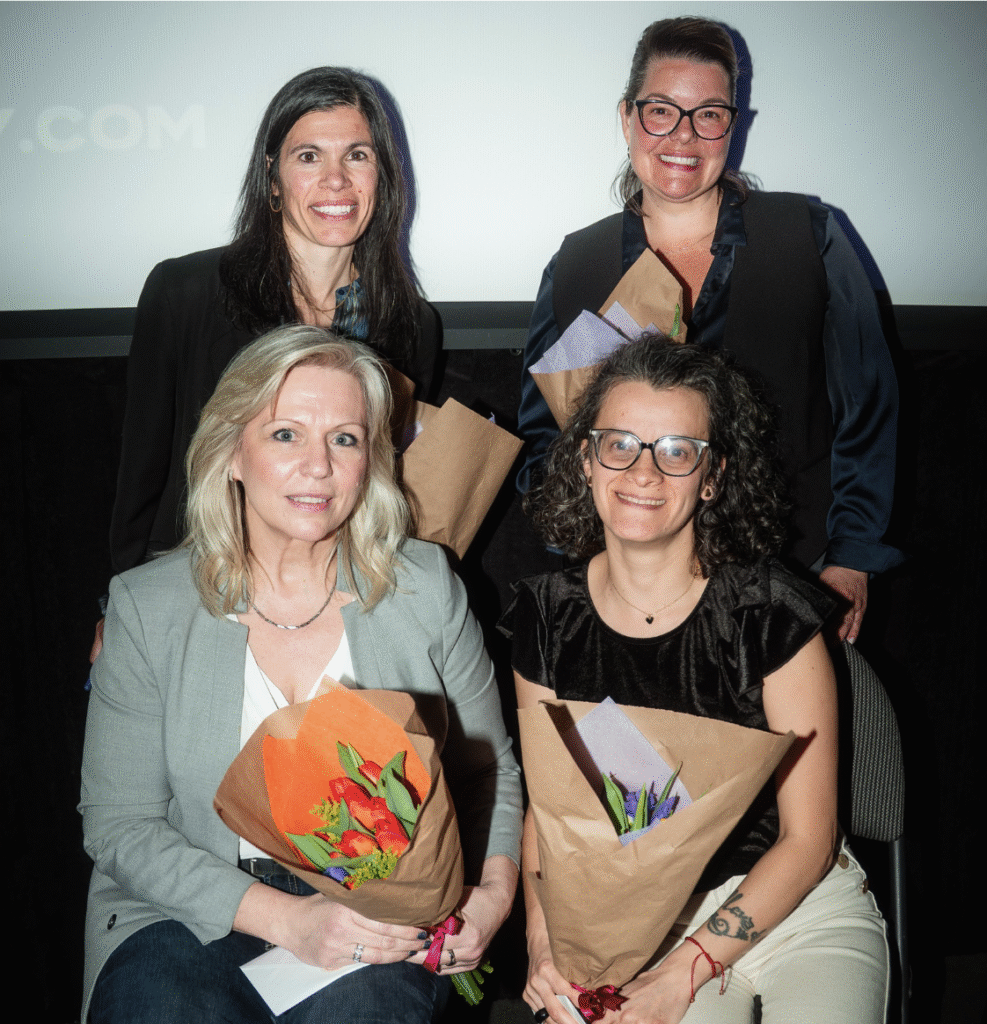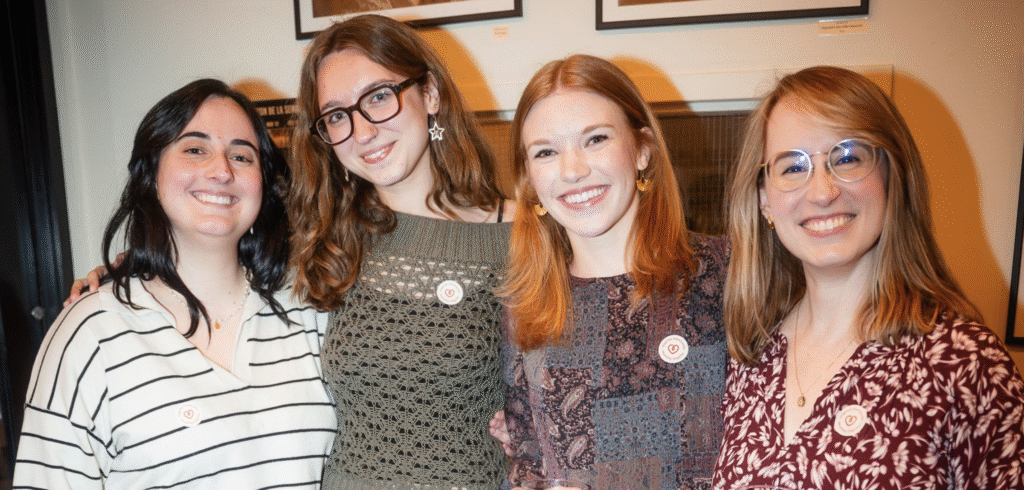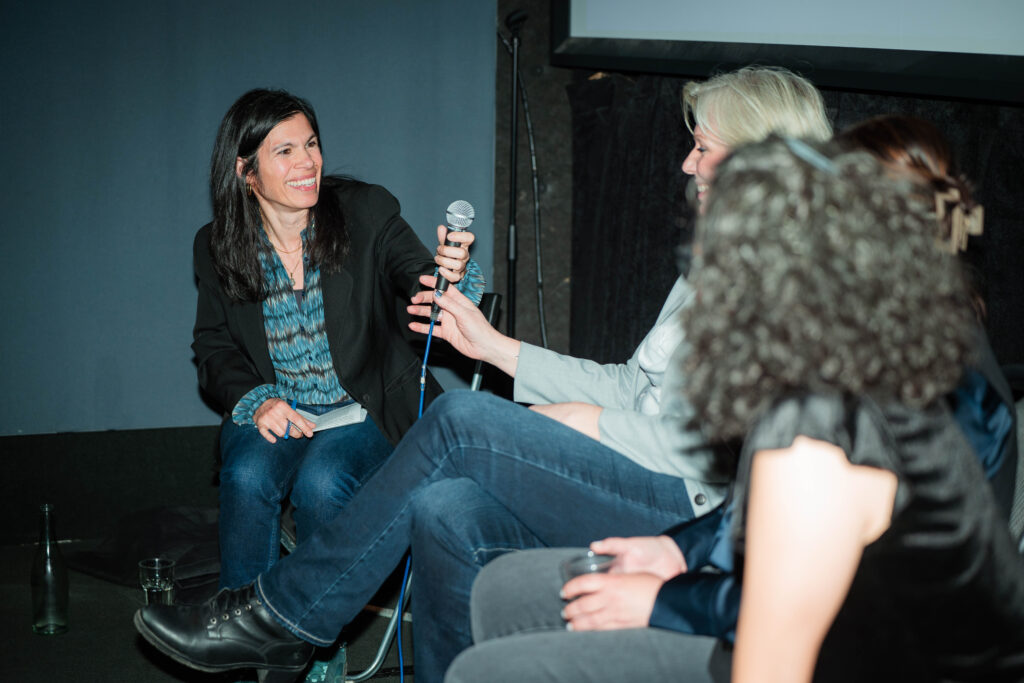Picture this: Cinema Moderne on a Tuesday evening in March, filled with curious faces of all ages. Some came with friends, others ventured solo. What brought them together? A shared desire to finally talk about something that’s been whispered about for far too long: menopause. On March 11th, Monthly Dignity hosted a screening of The M Factor: Shredding the Silence on Menopause, followed by a panel discussion that left people hungry for more conversation. Within days of announcement, the event was almost sold out. If we needed proof that people are ready to talk about menopause, we got it.
Why Menopause? Why Now?
The idea sparked from a simple pattern that we kept noticing. After our menstrual health workshops, the same question almost always came up: “When are you doing something on menopause?” The need was crystal clear: people were hungry for information, discussion, and most importantly, representation.
What started as a plan for a basic workshop quickly evolved when we dove into research and discovered a glaring reality: the massive information void around menopause. Not a little gap, but a canyon-sized absence of data, especially when it comes to the intersectional realities of this life transition. Story after story emerged of symptoms being dismissed, experiences being minimized, and people navigating this major life change essentially alone. That’s exactly why we wanted to screen this documentary, to spark conversations, increase visibility, and foster community.

The Event
The night kicked off with warm welcomes and mingling. By 7pm, the lights dimmed and the audience settled in for a film that was both informative and long overdue. The documentary touches on crucial topics often ignored in mainstream healthcare: the cognitive changes that can feel like losing yourself, the sleep disruptions that affect every aspect of daily life, and the profound identity shifts that accompany this biological transition. For many in the audience, it was the first time they’d seen their experiences reflected on screen.
When the credits rolled, the conversation had only just begun. Our post-screening panel featured a powerhouse lineup: Diana Palacios from Happy Periods, Marie-Josée Bourassa from Clinique Menojoie, Professor Robyn Jacquays, and art curator and researcher Tamar Tembeck. What followed was one of the most honest conversations about menopause we’ve ever witnessed.
Each voice brought an essential perspective to why intersectional menopause conversations matter. Marie-Josée shared twenty-five years of holistic menopause care experience, drawing on her work with major healthcare institutions and countless women’s stories rarely found in medical textbooks. Diana highlighted how cultural taboos create additional silence for Latin-American women and communities. Robyn brought fierce advocacy energy, encouraging everyone to approach their menopause journey with a sense of justice and refuse healthcare dismissal. As a moderator, Tamar effortlessly wove together academic insight with genuine curiosity, making complex topics feel both accessible and urgent. The result was a discussion that felt deeply human and empathetic, blending expertise and lived experience.

Navigating imperfect resources
We believe in transparency, especially when it comes to health information. The very day of our screening we came across concerns about medical claims in The M Factor, particularly around testosterone information, hormone levels, supplements, and hormone therapy risks and benefits. While the documentary gets a lot of things right, not all of the information is accurate or free of conflict of interest, and we believe people deserve to know that going in.
There are a few areas in which the film is misaligned with current research/information. The documentary suggests that hormone replacement therapy has no breast cancer risk at all, but research shows there is a small but real increase (about 6 extra cases for every 10,000 women per year). Here’s the nuance: when the Women’s Health Initiative (WHI) – the first major study to look at the effects of hormone replacement therapy – was conducted in the 1990s, the trial seemed to show that HRT increased the risk of breast cancer and cardiovascular disease. However, after reanalyzing the data, researchers realized that this was probably because the women in the WHI started HRT well after the onset of menopause, so the results don’t translate to women looking to start HRT to manage perimenopausal symptoms. Although the consensus is that HRT is a safe treatment for the symptoms of menopause, many people in the medical community are still hesitant to prescribe it despite its potential benefits.
The film also makes scary claims about 30% of women losing a tooth during the first five years of menopause, which is a misrepresentation of data. The research they cited actually examined tooth loss over a five-year period in women who were already postmenopausal (average age 66), not tooth loss specifically within the first five years after menopause begins. This distinction matters enormously when we’re telling people what to expect from their bodies.
The film also recommends routinely testing hormone levels (which medical organizations don’t support), claims that hormone therapy prevents heart disease and dementia (not currently recommended for these purposes), and promotes testosterone use beyond established guidelines. Additionally, the documentary makes general positive claims about supplements while some featured experts have financial interests in those supplements’ sales. Finally, it also overlooks proven non-hormonal treatment options like certain medications and cognitive behavioral therapy.
This isn’t about completely dismissing the film as it does important work in breaking silence and centering often-ignored voices, rather, this is about encouraging critical engagement with all health information, especially in a field where reliable resources are so limited. In a world where menopause knowledge is scarce, we’re not going to hide imperfect resources entirely. Instead, we want to equip people to engage with them thoughtfully, to seek multiple perspectives, and to ask critical questions. Because honestly? That approach feels essential when navigating any health topic, but especially one that’s been understudied and misunderstood for so long.
What made our evening at Cinema Moderne so valuable was having our incredible panelists there to provide context, nuance, and evidence-based perspectives alongside the film. Marie-Josée’s clinical experience, Robyn’s personal experience and advocacy lens, Diana’s educational approach, and Tamar’s thoughtful moderation created space for exactly the kind of complex, critical conversations that no single source can provide on its own.
Creating ripples
As people left Cinema Moderne, something had shifted. Quiet conversations echoed in the lobby: “Did you know about this symptom?” “I had no idea it affected your brain.” “My doctor never mentioned this.” These exchanges were proof that we’d achieved something important: people were connecting dots, sharing experiences, and realizing they weren’t alone in their confusion or concerns.
In the end, that’s what breaking silence really looks like. Not a single dramatic moment, but hundreds of small ones, rippling outward into communities and families and friendships, growing into something that transforms how we talk about reproductive health entirely.
So no, it wasn’t your average movie night. It was bigger. And yes, we’re already dreaming up the sequel…
If you would like to learn more about the documentary content concerns, check out the article by Dr. Jen Gunther

